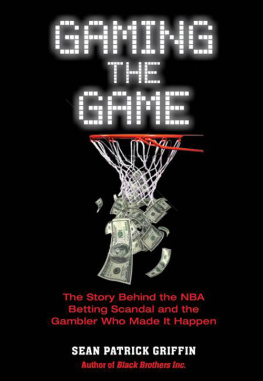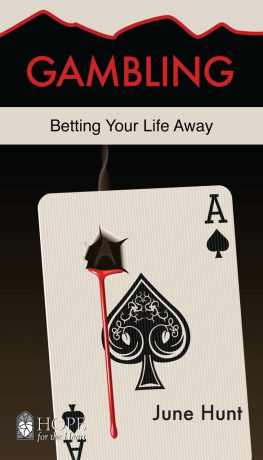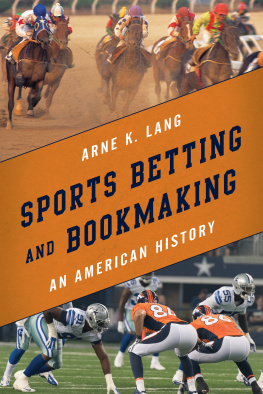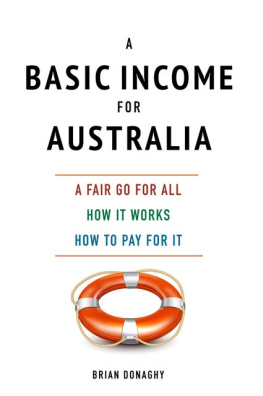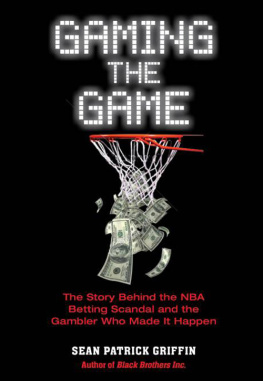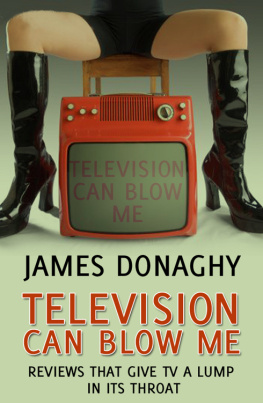T HIS SORT OF project requires the assistance of hundreds of people, and what follows (in no particular order) is my best attempt at a list of everyone who helped make Gaming the Game possible. I apologize in advance for those I no doubt forgot below.
As with much of my published research, this book would not have been possible without the unbelievable assistance of dozens of current and former law enforcement officials at the local, state, and federal levels. For obvious reasons, they do not wish to be named and I have thanked each of them personally for their various efforts. This is also true for the many members of the sports betting underworld who allowed me into their inner sanctum for, among other things, permitting me to: view betting records; accompany Vegas runners day-to-day; and sit with pro gamblers as betting lines were manipulated and money was moved electronically around the world. For a gambling novice like me, these momentseven if not explicitly referenced in Gaming the Game were key to my understanding of big-time bettings sociology and thus to this project. The same is especially true for a handful of gamblers who are named in the book, especially Louie the Lump, Tiger, Bull, and Domino. Many of these folks had little to gain (and much to lose) by allowing me into their respective worlds, and I remain grateful.
Former FBI Supervisory Special Agent Phil Scala was the lone agent involved in the cases against the three NBA betting scandal conspirators who could speak on the record, and deserves thanks for offering his insights into the investigation, and for his suggested lines of inquiry. I especially need to thank attorney Jack McMahon for his generosity and accessibility throughout this project. Jacks insights went well beyond his defense of Jimmy Battista, and were key to my understanding of various legal matters. I would also like to express my gratitude to attorney Larry Pedowitz, author of the NBAs report on the scandal, who was always gracious and patient regarding various matters during the course of the research. Thanks also go to the helpful folks within the press offices of the following agencies: Montgomery County (PA) District Attorneys Office; Federal Bureau of Investigation regional offices in Philadelphia, Manhattan, and Brooklyn; U.S. Attorneys Offices in Philadelphia and Brooklyn; and the Federal Bureau of Prisons regional office in Pensacola, Florida.
The area of sports betting law and enforcement is ever-changing, as evidenced by the recent battles in various states and within the federal government regarding various proposals. I am thus indebted to two individuals above others for taking their time to walk me through the history of such laws and the enforcement of them: David G. Schwartz, Director of the Center for Gaming Research at the University of Nevada Las Vegas (UNLV); and James Doug Dunlap, Forensic Examiner in the FBIs Cryptanalysis & Racketeering Records Unit (CRRU).
Thanks also to: Benjie Cherniak and Angie Hart at Don Best, without whose assistance much of the betting line analysis would not have been possible; the online staff at Covers.com who also humored several of my inquiries; Wayne L. Winston, Professor of Operations & Decision Technologies at Indiana University, for his prompt replies to my questions regarding his work on sports betting; Temple University urban historian Mark H. Haller, who long ago shared his considerable insights and greatly influenced my understanding of the gambling underworld; and George Anastasia of the Philadelphia Inquirer , a longtime authority of the areas organized crime scene, who has always been willing to humor my requests for his time.
My academic home, Penn State Abington, is going through a promising yet challenging transition from a college more grounded on teaching to one more balanced with research. As such, faculty and staff are being pushed in multifarious ways, and the process has not been entirely harmonious. For their grace in dealing with the likes of me, Abingtons pleasant and incredible staff members deserve at least my thanks in words, especially: Marcia Donahue, Donna Millinghausen Koenig, Phyllis Martin, Betty Mason, Eleanor Meehl, Janet Mignogno, Susan Paciolla, Joan Raudenbush, Lizanne Sarvey, and Stayce Shaffert. Penn State Abingtons Chancellor, Karen
W. Sandler, has never wavered in her support of my work. The same is true for Associate Dean Samir Ouzomgi and Social Science Division Head Gary S. Calore, and I thus need to thank each of them. Many of my Penn State colleagues (at Abington and at PSUs main campus in University Park, PA) have, as usual, lent their expertise, counsel, and time, and I owe them a great deal. This is especially true for the Criminal Justice faculty at Penn State Abington (Trish Collins, Lisa Morris, John Sullivan, and Patti Workman), who have accommodated so much of my insanity during the course of this project. Abingtons Director of Athletics, Karen Weaver, has been a welcome addition to our campus and a great sounding board during this research, and I must especially thank her as well. Other Penn Staters of note include: Andy August, Bob Barton, Theresa Bloom, Deb Casey, Carol DeBunda, Bella Friesel, Lonnie Golden, Ellen Knodt, Kim Menard, Steve McMillan, Judy Newman, Jane Owens, Dave Ruth, Jim Smith, and Ron Zigler.
I first contacted former investigative journalist Jim Nicholson at some point in the 1990s when I was working on my Ph.D. dissertation, and he has not stopped lending his professionalism to my work ever since. I am forever indebted to him for the countless ways he has helped me with work like Gaming the Game . For much of my written work the past fifteen or so years, I have relied upon the editing skills of several colleagues, friends, and family members who have been rather giving of their time. Though I cant name them here, they each deserve special thanks for their great insights and criticisms; the book is better because of their comments. Similarly, I have long been surrounded by a coterie of friends who commonly offer their various (and typically unsolicited) opinions on much of my work. In the case of this particular project, their assistance, insights and criticisms were more welcome than usual, and thus I feel obligated to thank the following publicly (with the understanding I owe these fellas nothing , especially now): Scott Copman, Eric Hunn, Stu Revness, Andrew Senzer, Matt Spak, and Keith Traynor.
Pete Walsh, of U.K.-based Milo Books, has been a help in many ways, and was always willing to offer his insights as a publisher, author, editor, and friend. I owe you much, Pete. Petes colleague, publisher Carole Stuart, at Barricade Books has put up with far more (I am sure!) than she ever bargained for when she took on this unwieldy project and its oft-unavailable author. I hope you are satisfied with the finished product, Carole, and that it in some way alleviates the many frustrations you experienced throughout the process. Thanks also to Barricades print production manager, Mark Morrell, for his patience and professionalism. Entertainment attorney Judy Karfiol has continued to endure my ignorance of all things Hollywood, and I remain grateful to her for going beyond what should be expected of someone in her position (especially for GTG -related happenings).
Military officer, fighter pilot, and all-around good guy Kevin Kelly deserves the credit for getting this project started and, perhaps more appropriately, for seeing it through. Your yeoman, behind-the-scenes efforts were greatly appreciated, Kev. Historian/criminologist Alan A. Block had nothingyet everythingto do with this book, and I only wish he could grasp my profound appreciation for the variegated lessons he taught me over many years. The consummate professional and mentor will never be forgotten by me or by those whose lives and careers he impacted during his time at the University of Delaware and at Penn State. Alans wife, Constance Weaver, is always willing to lend a hand, and deserves special thanks for all she has done for Alan as his health has deteriorated. Please dont ever think your grace and your efforts have been taken for granted, Connie; youre a special person. Speaking of special people...

